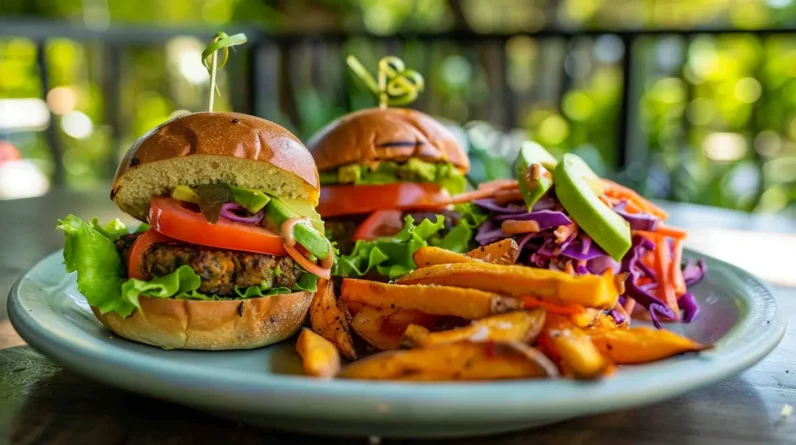
The main difference between vegan and vegetarian veggie burgers comes down to their core ingredients and protein sources. While vegetarian versions include eggs and dairy proteins (like whey or casein) as binders and flavor enhancers, vegan options rely entirely on plant-based ingredients such as pea protein, soy, or wheat gluten. We’ll typically find that vegetarian patties provide 15-25g of protein per serving with a firmer, more varied texture, while vegan versions contain 10-20g of protein with a denser consistency. Both offer sustainable alternatives to meat burgers, though vegan options have an even lower environmental impact. Understanding these distinctions can help us make informed choices for our dietary needs.
Understanding Basic Ingredient Differences
Many vegetarian and vegan veggie burgers differ primarily in their protein sources and binding ingredients. Vegetarian patties often contain eggs and dairy proteins, like whey or casein, which serve as both protein sources and natural binders. In contrast, vegan burgers rely on plant-based proteins such as pea protein isolate, soy protein, or wheat gluten, combined with methylcellulose or other plant-based binders.
We’ll often find that vegetarian burgers incorporate cheese or milk powder for flavor enhancement, while vegan versions achieve umami notes through fermented ingredients, yeast extracts, or mushroom powders. Both varieties typically share a base of legumes, grains, or vegetables, but their texturizing agents diverge: vegetarian options might use egg albumin, while vegan versions employ starches, gums, or protein texturization techniques.
Common Binding Agents Used
Both vegan and vegetarian veggie burgers require effective binding agents to achieve their characteristic texture and structural integrity. In vegetarian options, we commonly find eggs and cheese serving as primary binders, providing protein structures that help hold ingredients together while adding moisture and richness. These animal-derived binders create a cohesive texture that many consumers prefer.
For vegan burgers, we rely on plant-based alternatives such as ground flaxseed mixed with water, chia seeds, mashed potatoes, or commercial egg replacers. Essential wheat gluten (seitan) and methylcellulose also function as effective vegan binders. These ingredients create protein networks and gelatinous structures that mimic the binding properties of eggs. Additionally, pureed chickpeas, black beans, and sticky rice contribute natural binding properties while enhancing nutritional content.
Protein Sources and Content
Protein content varies considerably between vegan and vegetarian veggie burger formulations, with each type drawing from distinct ingredient sources. Vegetarian options often incorporate eggs and dairy proteins, achieving 15-25g of protein per patty through ingredients like whey, casein, and egg albumin. These animal-derived proteins provide a complete amino acid profile.
Vegan burgers rely on plant-based proteins, typically containing 10-20g per patty. We’ll find combinations of legumes (soybeans, chickpeas, black beans), grains (quinoa, brown rice), and isolated plant proteins (pea protein, textured vegetable protein, wheat gluten) in these formulations. While single plant sources may lack certain amino acids, manufacturers strategically combine complementary proteins to create nutritionally complete products. Modern plant protein extraction techniques have enabled vegan options to match or exceed the protein content of their vegetarian counterparts.
Taste and Texture Comparison
Distinctive textural differences separate vegan and vegetarian veggie burger options, largely due to their protein composition and binding agents. While vegetarian patties often contain eggs and dairy products that create a firmer, more cohesive texture, vegan burgers rely on plant-based binders like flax seeds, chia seeds, or modified starches.
We’ll find that vegan burgers typically exhibit a denser, more uniform consistency due to concentrated plant proteins like pea or soy isolates. In contrast, vegetarian options often have a more varied, heterogeneous texture from the combination of dairy proteins and vegetables. The mouthfeel differences are notable: vegetarian patties tend to be more tender and moist, while vegan versions can range from chewy to crumbly depending on their specific formulation. These textural variations directly impact how the burgers hold up during cooking and affect overall eating satisfaction.
Environmental Impact and Sustainability
When evaluating environmental footprints, vegan and vegetarian burger options demonstrate markedly different impacts on sustainability metrics. Vegan burgers typically require 75-95% less water usage and generate 87-90% fewer greenhouse gas emissions compared to conventional meat patties. They’re also more environmentally efficient than vegetarian options containing eggs and dairy.
While both types reduce land use compared to meat, vegan patties made from pea protein, soy, or wheat gluten have a noticeably lower carbon footprint than vegetarian versions using cheese or egg proteins. We’ve found that dairy-based ingredients in vegetarian burgers contribute an additional 10-15% to their overall environmental impact. The production of eggs and cheese requires more resources, including feed for livestock and energy for processing, making purely plant-based options the more sustainable choice for environmentally conscious consumers.
Nutritional Benefits and Considerations
Both vegan and vegetarian burger options offer unique nutritional profiles that warrant careful consideration. Vegetarian burgers containing eggs and dairy typically provide complete proteins, vitamin B12, and enhanced calcium absorption. We’ll find they average 12-15g of protein per patty, with excellent bioavailability.
Vegan burgers, while free from cholesterol, often require careful formulation to match their vegetarian counterparts’ nutritional density. They rely on strategic combinations of legumes, grains, and fortified ingredients to deliver essential amino acids. We’re seeing innovative ingredients like pea protein isolate, quinoa, and nutritional yeast delivering 10-20g of protein per serving, plus essential B-vitamins and iron. However, we must consider supplementing B12 and monitoring omega-3 fatty acids when choosing exclusively vegan options.
Conclusion
We’ve explored the key distinctions between vegan and vegetarian veggie burgers, finding that binding agents and protein sources greatly impact their nutritional profiles. Research shows that while both options support sustainable eating, vegan versions typically generate 2.5 times less carbon emissions than their vegetarian counterparts. When selecting between these plant-forward options, consider your dietary needs, environmental priorities, and taste preferences to make an informed choice aligned with your nutritional goals.







